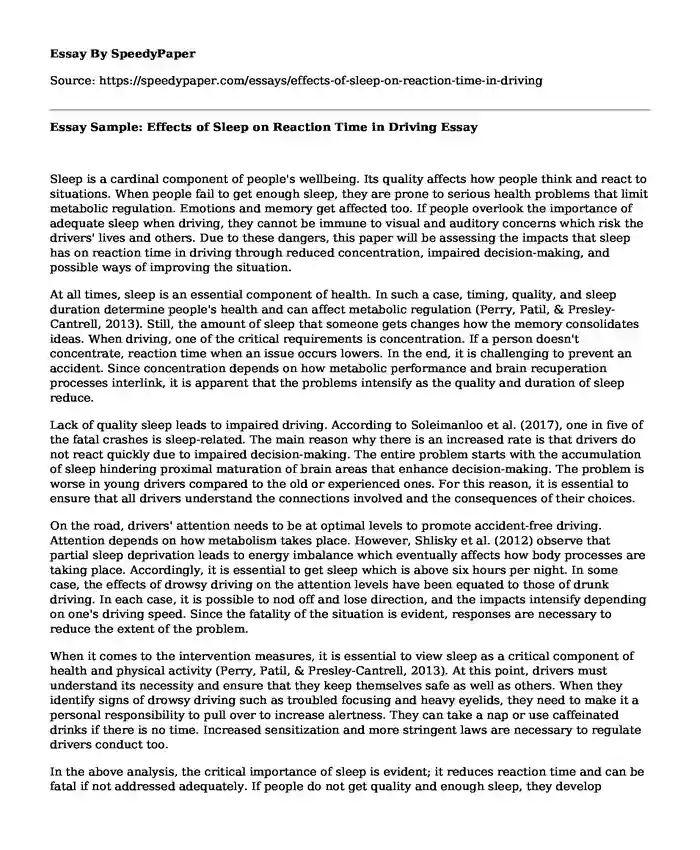
| Type of paper: | Essay |
| Categories: | Health and Social Care Human behavior |
| Pages: | 3 |
| Wordcount: | 705 words |
Sleep is a cardinal component of people's wellbeing. Its quality affects how people think and react to situations. When people fail to get enough sleep, they are prone to serious health problems that limit metabolic regulation. Emotions and memory get affected too. If people overlook the importance of adequate sleep when driving, they cannot be immune to visual and auditory concerns which risk the drivers' lives and others. Due to these dangers, this paper will be assessing the impacts that sleep has on reaction time in driving through reduced concentration, impaired decision-making, and possible ways of improving the situation.
At all times, sleep is an essential component of health. In such a case, timing, quality, and sleep duration determine people's health and can affect metabolic regulation (Perry, Patil, & Presley-Cantrell, 2013). Still, the amount of sleep that someone gets changes how the memory consolidates ideas. When driving, one of the critical requirements is concentration. If a person doesn't concentrate, reaction time when an issue occurs lowers. In the end, it is challenging to prevent an accident. Since concentration depends on how metabolic performance and brain recuperation processes interlink, it is apparent that the problems intensify as the quality and duration of sleep reduce.
Lack of quality sleep leads to impaired driving. According to Soleimanloo et al. (2017), one in five of the fatal crashes is sleep-related. The main reason why there is an increased rate is that drivers do not react quickly due to impaired decision-making. The entire problem starts with the accumulation of sleep hindering proximal maturation of brain areas that enhance decision-making. The problem is worse in young drivers compared to the old or experienced ones. For this reason, it is essential to ensure that all drivers understand the connections involved and the consequences of their choices.
On the road, drivers' attention needs to be at optimal levels to promote accident-free driving. Attention depends on how metabolism takes place. However, Shlisky et al. (2012) observe that partial sleep deprivation leads to energy imbalance which eventually affects how body processes are taking place. Accordingly, it is essential to get sleep which is above six hours per night. In some case, the effects of drowsy driving on the attention levels have been equated to those of drunk driving. In each case, it is possible to nod off and lose direction, and the impacts intensify depending on one's driving speed. Since the fatality of the situation is evident, responses are necessary to reduce the extent of the problem.
When it comes to the intervention measures, it is essential to view sleep as a critical component of health and physical activity (Perry, Patil, & Presley-Cantrell, 2013). At this point, drivers must understand its necessity and ensure that they keep themselves safe as well as others. When they identify signs of drowsy driving such as troubled focusing and heavy eyelids, they need to make it a personal responsibility to pull over to increase alertness. They can take a nap or use caffeinated drinks if there is no time. Increased sensitization and more stringent laws are necessary to regulate drivers conduct too.
In the above analysis, the critical importance of sleep is evident; it reduces reaction time and can be fatal if not addressed adequately. If people do not get quality and enough sleep, they develop concentration problems and impaired decision making. In the end, they are not swift to make decisions on the road as the situation requires. To mitigate this problem, personal responsibility, stricter laws, and increased awareness need to come into the equation. Their incorporation can ensure that people embrace the necessity for adequate sleep which will reduce the extremity of the situation as experienced today.
References
Perry, G. S., Patil, S. P., & Presley-Cantrell, L. R. (2013). Raising awareness of sleep as a healthy behavior. Preventing chronic disease, 10.
Shlisky, J. D., Hartman, T. J., Kris-Etherton, P. M., Rogers, C. J., Sharkey, N. A., & Nickols-Richardson, S. M. (2012). Partial sleep deprivation and energy balance in adults: an emerging issue for consideration by dietetics practitioners. Journal of the Academy of Nutrition and Dietetics, 112(11), 1785-1797.
Soleimanloo, S. S., White, M. J., Garcia-Hansen, V., & Smith, S. S. (2017). The effects of sleep loss on young drivers' performance: A systematic review. PloS one, 12(8), e0184002.
Cite this page
Essay Sample: Effects of Sleep on Reaction Time in Driving. (2022, Nov 21). Retrieved from https://speedypaper.net/essays/effects-of-sleep-on-reaction-time-in-driving
Request Removal
If you are the original author of this essay and no longer wish to have it published on the SpeedyPaper website, please click below to request its removal:
- Free Essay: International Business and Globalization on the Example of Gazebo Restaurant
- Understanding of the Definition of an Emergency - Essay Sample
- Free Paper about the Impact of Religion and Culture on International Business
- Essay Plan and Essay Sample on the Subject of Dementia with Lewy Bodies
- Essay Sample on Risks to Homeland Security and Mitigation Strategies
- Essay Example. Abortion is Morally Wrong
- Free Essay Example on Obedience in American Society
Popular categories




